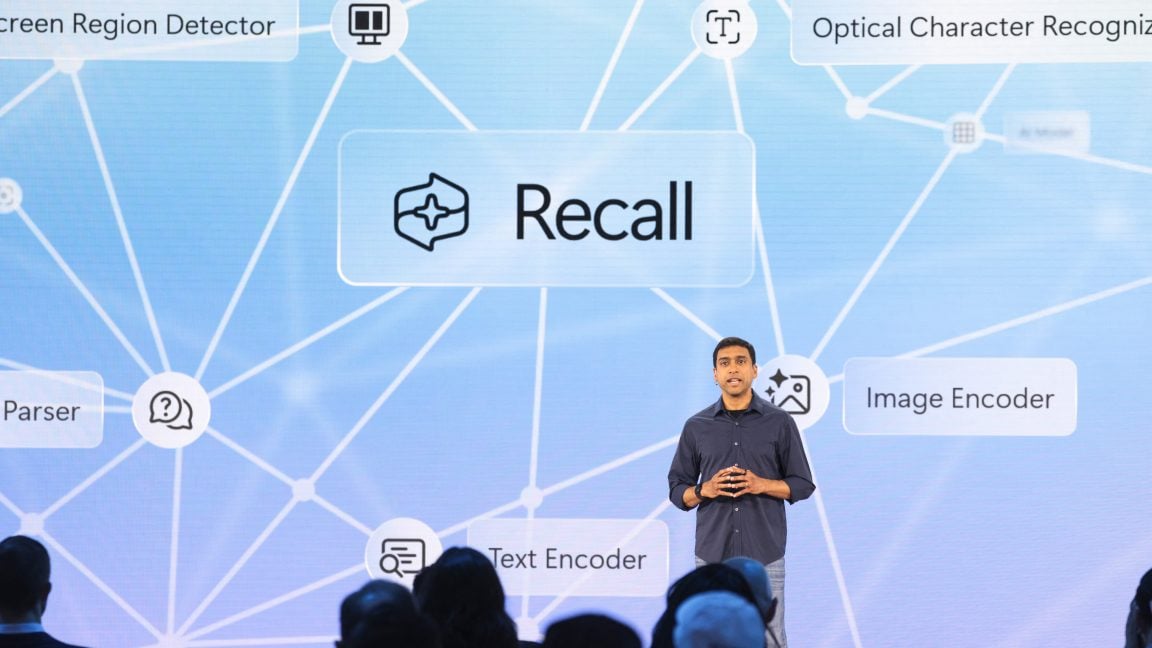- cross-posted to:
- [email protected]
- [email protected]
- cross-posted to:
- [email protected]
- [email protected]
Regular windows user: uses PC
‘Roommate’ standing behind them: takes photo of screen
User: dude…
Roommate: what?
User: what the fuck?
Roommate: is ok… it’s so you can scan through them later and see what you’ve been doing
User:
Roommate:
User:
Roommate: takes photo of screen
User: the… fuck? that’s… that’s my credit card #
Roommate: oh…uhh…I was going to delete that
User: did you even notice it was there?!
Roommate: yes! I mean no! I mean…err
User:
Roommate:
User:
Roommate: takes photo
User: grabs baseball bat
I don’t understand how businesses that use windows for employee laptops are not throwing a fucking tantrum. I would be.
They already said it will be off by default for all Enterprise editions of windows. They’re protecting their corporate buddies but normal users get fucked, as always.
Off by default. For now…
One step. The corps know it. It’s been happening for years. One step, then soon after you just accept that’s how it is. Then another step. And another. And another…
I actually really doubt it’d ever go on by default for enterprise installations. One tiny slipup in GPO and IT departments could end up with the most massive explicit data leak in history, many many companies and governments working with very sensitive data would drop all Microsoft products in a heartbeat. Microsoft knows that is an impossible sell and really not worth the squeeze vs just shoving a larger dildo up the private consumer’s ass.
One tiny slipup in GPO and IT departments could end up with the most massive explicit data leak in history,…
I get what you’re saying, but:
Apply this same logic to ‘Considerable and substantial direct access to the kernel for who knows how many third party software engineers, without meaningful or comprehensive review of how they’re using that access.’
Why, one serious, overlooked error on a widely used enterprise software with this kernel access could basically brick millions of business computers and cost god knows how many millions or billions of dollars, they’d never do that!
… cough CrowdStrike cough.
Microsoft Azure already leaks secrets and nobody cares. As long as it has all required certifications it’ll be fine.
I think you misunderstand the relationship Microsoft has with corporations. If they turn on something like this after the fact while promising to do the opposite previously they will get thoroughly railed in court and then no one will ever buy their products ever again.
The reason that companies use Windows rather than running everything on Linux is the absolutely enormous support base that Windows has. The moment it becomes more problematic to use Windows than to just deal with the support issues of a Linux OS is the moment that everyone will switch to Linux.
Work in the space, I don’t misunderstand. Corps are one thing, what about the rest of civilization? Also some corps might even embrace as a means to spy on their employees work habits or something dystopian like that.
Not every business uses enterprise. I suspect quite a few use pro.
Then that will be Microsoft’s captive audience upsell. “Ohhh don’t want us collecting your secrets? Damn better pay up for enterprise licenses…”
Just because you’re running pro doesn’t mean you don’t have domain policies.
Yes and no.
Enterprise has just lesser headaches and no need to customize the installation as much as the adware bloated default iso.I’m just saying that you can turn recall off in GPO. As long as Windows pro machines are bound to the domain.
I checked my work laptop running W11. Recall was installed and enabled. No copilot+. IT had no idea. Disabled it right away.
They just turn it off with group policy or intune.
can’t wait for the first “whoops, it accidentally got turned on beccause of a bug” news headline
This.
We did get pissed off, then turned on a GPO to block it
Even easier. It’s off by default in enterprise and education SKUs.
Ours is. Last I heard, our Client Management team is already looking for different ways to disable it and make triple sure it stays off.
(inb4 “Switch to Linux”: several thousand users, specialised software and a technologically conservative company would already make that a non-starter)
I don’t disagree that it would be tough, but they had to start from nothing when choosing Windows originally. It all had to be learned and built up at some point. It can again, and hopefully on an open platform that won’t fuck them over in the future. (I know, there’s no chance, but there should be.)
Everyone always complains that whatever they want isn’t on Linux. Well, it wasn’t on Windows at some point either. Make a user-base for it on Linux or make it yourself. Someone did it in the past. It can be done again.
Inertia is a hell of a thing to try and overcome. It’s a big deal for most companies to change out an important piece of software, let alone an entire OS and everything that comes with it. It could happen one day, I just don’t expect to see it.
I use Linux privately, and haven’t had a Windows OS on my PC in years except for a VM I needed for a university project. I’m all for hoping that specialised apps get developed for Linux too. I like mine and would probably enjoy using it for private purposes too, but it won’t work with wine and learning different tools is obviously an additional time investment in my free time compared to the one I get paid for learning.
But I’m both quick and happy to learn. Many people are not (and I see that daily with my users). The cost of switching and disruption in productivity would probably be disastrous enough to ruin the company even before considering the fact that “industry giant unable to fulfill contractual obligations because they have to rebuild half their infrastructure from nothing” would be a crippling blow to its professional reputation in an industry where IT is still considered second-class at best, the ideological gain of no longer depending on Microsoft would net them nothing and in an economic system where short-term profitability is more important than long-term independence.
And that’s not considering the difficulty of convincing company leadership that Windows really is that bad and Linux really is much better and that we only need to provide the financial incentive and invest the time and money to have someone port already expensive software to a different platform. FFS, we’re still struggling to get people to see IT as a service rather than an expense.
Finally, even if they were to switch out their entire IT infrastructure, they’d start asking whether it would be cheaper to outsource our internal IT to a company that already knows the new stuff than to retrain all of us. I’d very much like to keep my permanent position, even if it means using Windows.
I totally agree. I hinted towards what you’ve said in my comment. It still doesn’t change the fact that at some point Windows was chosen and everything was built. The implies another choice could still be made. It’s just not going to happen with an established company most likely. It would be nice to see newer companies that don’t have the same inertia switch to Linux at least and start the transition. So much is stuck in a “business culture” that treats Windows as the only option though, but again this wasn’t always true and can be changed again if enough companies started to transition.
Eh, between the financial expense, the human reluctance to change and the still very real barrier of “We can’t migrate where there’s nowhere to go” with respect to the software landscape, I think we need to compare our definitions of could. It’s not just a business culture issue either. All change brings friction, but trying to replace the entire infrastructure of a company (and it has to be pretty much everything - one selling point of MS is how thoroughly integrated its products are) is basically ripping out most of the internal organs and replacing them with transplants, but also trying to keep the patient alive somehow… and you need to sell the people with the money on the idea.
Throwing away and starting over is costly, no matter the context. So no, I don’t think larger companies can even make that choice at this point.
Smaller companies without the same inertia, in industries where there are Linux-compatible tools? Yeah, they can, provided the software they need is there too.
MS know who butters their bread. Businesses get given the tools to control windows properly. Even without needing to resort to LTSC versions, domain joined with group policy, you can manage all the shitty parts of windows to make it behave as you wish - even down to control over when you receive the updates
Businesses will embrace this. The data will be tied to the m365 data governance agreement.
It’s because they want this. Microsoft Recall I am sure on a domain will be expanded upon to allow for auto capturing screenshots that can be parsed with AI to generate statistics of who is “working”. Without the legal issue of saying “we don’t install monitoring software”.
Microsoft will slap a license on that bad boy and businesses will eat it up to use against employees they want to terminate for cause anyway because they slipped up viewing a video from manager who sent them a cat video to watch that is less than 30 seconds long.
The other is how businesses will be crying when the feds just use it against them for finding fraud in business because they never bought the “enterprise” license that limits sharing and that doesn’t funnel everything to Microsoft anyway.
Noppeee. Very happy I switched to Linux. Despite how annoying all the hounding about it was, it’s galaxies better than the shitshow Windows 11 is becoming.
The malicious thing about recall is, it doesn’t matter how much you protect yourself, every one you interact with has to protect themselves too, or your private chats are gonna land there anyway
Ahh yes, I like to start my Saturday morning with a little horrors beyond human comprehension.
Ah, surprised I didn’t think of that. Fuckin hell. There’s no good way to have a private conversation these days.
Easiest way to brick e2e encryption
The nice thing IMO about Linux is that it’s “learn and forget”, you only need to learn things once (like sudo, apt-get or whete is the home dir and what is it), it won’t be randomly changed in an upcoming forced update.
And when shit is gonna change, you can downgrade to the older version, but even then, the changes always ends up being warned for a long ass time that “hey, X thing will change soon!”
Lawyers: “Generating music using a machine learning model trained using real artists’ music (without permission) does not violate those artists copyright!”
Therefore
Big Data: “Generating a black box replication of your identity trained on your private personal information and activity (without permission) does not violate your privacy!”
During that time, you can easily install Ollama on an old computer.
With a client like Oatmeal, you can save your session/ reload/delete as you wish; so your model remembers what you want.
I am running llama3.1:8b, it’s good enough for the day-to-day operations.
- Need for a spyware: 0
- Need to take screenshots of my desktop: 0
- Need to buy another computer for the hype chipset: 0
- Need of Microsoft bullshit: 0
My old computer is apparently “not good enough” for windows 11, but it’s surely good enough for my personal AI running on Linux though!
Interesting. A few questions, if I may.
Are you running ollama in the same system as the one consuming it ? If yes does it always run in background ? Does it impact performance of other applications when it runs in background?
No, Ollama is running on an old PC with a GeForce 1060 and 16gig of ram…
Yes, it’s a “webserver” running in the background exposing an API.
However, if I “top” my system, without chatting, it sits at 0% usage; it’s only when asking that the system peeks at around 55-70% CPU.
You have to understand there is 2 things here: the server and the model. The server is always running, but requires next to nothing in terms of resources.
The model is what computing your questions, this is the heavy part. It’s started on use, then after a delay, it’s closing.
TL;DR To answer your real question, you could use Ollama on the same system that you are using.
I tried llama3.1:8b and it’s absolutely horrible.
You can use larger “open” models through free or dirt-cheap APIs though.
TBH local LLMs are still kinda “meh” unless you have a high vram GPU. I agree that 8b is kinda underwhelming, but the step up to like Qwen 14B is enormous.
Everytime I hear the word Microsoft or windowsI only hear a toilet flushing. is it me?
No seriously, I’m really trying to find a legit scenario where such tool is actually needed and I honestly can’t think on any.
There are plenty of tools out there to help you track your work so no need for any of this bullshit.
legit scenario where such a tool is actually needed
The “legit” reason has nothing to do with user experience and everything to do with Microsoft & their 874,289,532 advertising partners.
Regardless of the marketing spin they’re putting on it now - Recall will be used for mass data collection and training MS’s LLM. They’ll wait for enough adoption of Win11 & Recall before putting the “release of information” clause into their T&Cs.
Recall isn’t for users. It’s for Microsoft.
nope
Oh good.









